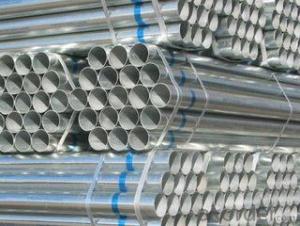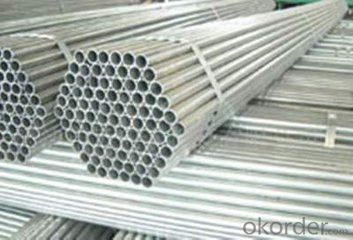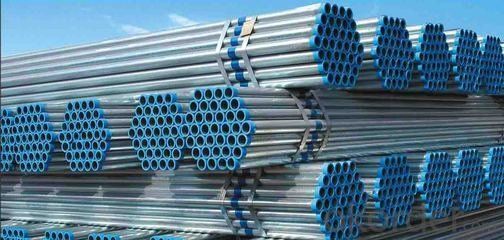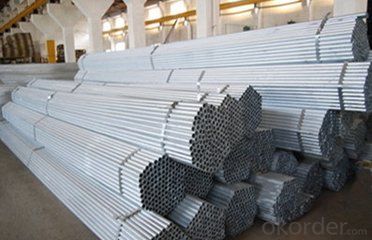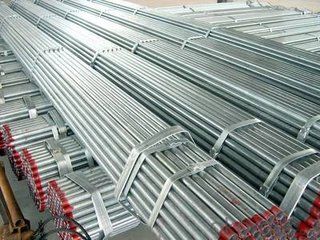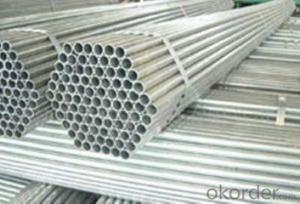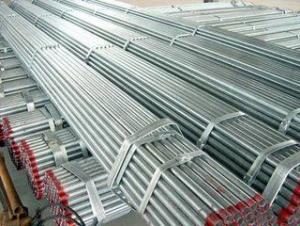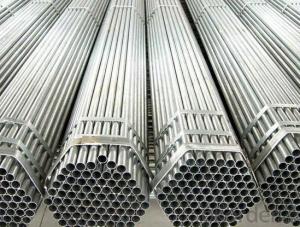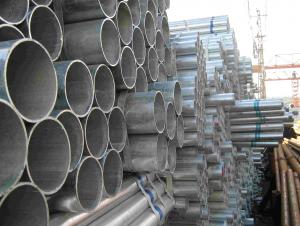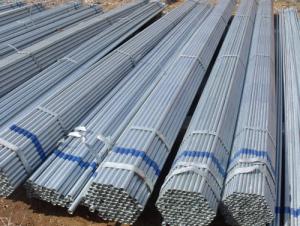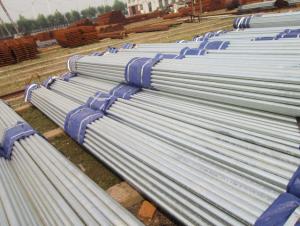3 1/2“ HOT-DIP GALVANIZED PIPE FOR FLUID TRANSPORTATION GOOD PRICE
- Loading Port:
- Tianjin
- Payment Terms:
- TT OR LC
- Min Order Qty:
- 10 m.t.
- Supply Capability:
- 10000 m.t./month
OKorder Service Pledge
OKorder Financial Service
You Might Also Like
Specifications
HOT-DIP GALVANIZED PIPE FOR FLUID TRANSPORTATION
1.OD:33.4-114.3mm
2.WT:2.0-9.0mm
3.Zinc:200~600g/m2
Good serveice
We Offer You:
HOT-DIP GALVANIZED PIPE FOR FLUID TRANSPORTATION
HOT-DIP GALVANIZED PIPE FOR FLUID TRANSPORTATION | |||
1. Material | Steel Grade | Q195, Q235, Q345 etc. | |
Material Type | Available in cold rolled and hot rolled | ||
2. Size | W.T | 1.0mm-12mm | |
Diameter | 20mm~273mm | ||
Length | 5.8m-14m | ||
3. Zinc Coating | 200~600g/m2, could be thicker or thinner if you need | ||
4. Certification | BV, IAF, SGS,COC, ISO etc. | ||
5. Welding Technology | Longitudinal ERW | ||
6. Application | Urban construction, machine structure, agriculture equipment, water and gas pipes etc. | ||
7. Packing | Packing in bundle with steel strips; with seaworthy package at the end; could be done with your requirement. | ||
8. Delivery Time | Usually within 10-30 days after receipt of deposit, ASAP | ||
9. Trade Terms | FOB, CFR, CIF etc. | ||
10. Payment Terms | T/T, L/C etc. | ||
11. Loading Port | Xingang , Tianjin | ||
12. Original Place | Tianjin, China | ||
13. Company Information | Name | Reliance Metal Resource Co., Ltd | |
Type | Manufacture and trading company | ||
Supply Ability | 360,000 tons per year | ||
Galvanized Round Steel Pipe's Materials
| Elements Material | Chemical Compsition% | Mechanical Property | ||||||
| C% | Mn% | S% | P% | Si% | Yield Point (Mpa) | Tensile Strength(Mpa) | Elongation (%) | |
| Q195 | 0.06-0.12 | 0.25-0.50 | <0.050 | <0.045 | <0.030 | >195 | 315-430 | 32-33 |
| Q215 | 0.09-0.15 | 0.25-0.55 | <0.05 | <0.045 | <0.030 | >215 | 335-450 | 26-31 |
| Q235 | 0.12-0.20 | 0.30-0.70 | <0.045 | <0.045 | <0.030 | >235 | 375-500 | 24-26 |
| Q345 | <0.20 | 1.0-1.6 | <0.040 | <0.040 | <0.55 | >345 | 470-630 | 21-22 |
- Q: How are steel pipes threaded for connection?
- Steel pipes are threaded for connection using a threading machine or a die. The pipe is clamped securely into the machine, and a rotating die is then used to cut threads into the pipe's surface. This process creates the necessary grooves and ridges that allow the pipes to be securely connected together.
- Q: How are steel pipes protected against galvanic corrosion?
- Steel pipes are protected against galvanic corrosion through various methods including the application of protective coatings such as zinc or epoxy, cathodic protection systems, and the use of corrosion inhibitors.
- Q: What is the elasticity of steel pipes?
- The elasticity of steel pipes refers to their ability to deform under external forces and return to their original shape once the force is removed. Steel pipes are known for their high elasticity, which enables them to withstand various forms of stress and strain without permanent deformation. This property is crucial in applications where pipes are subjected to pressure, bending, or other mechanical forces. The elasticity of steel pipes is determined by the material properties of steel, such as its Young's modulus, which is a measure of its stiffness and ability to resist deformation.
- Q: Are steel pipes suitable for use in coastal areas?
- Yes, steel pipes are suitable for use in coastal areas. Steel is highly resistant to corrosion and can withstand the harsh environmental conditions typically found in coastal regions, such as saltwater spray and high humidity. Additionally, steel pipes offer excellent structural strength, making them well-suited for various applications including marine construction, offshore oil and gas platforms, and coastal infrastructure projects.
- Q: How are steel pipes installed underground?
- Steel pipes are installed underground through a process called trenching, where a trench is dug to the desired depth and length. The steel pipes are then placed in the trench and secured using various techniques such as welding or threading. The trench is then backfilled, ensuring proper compaction around the pipes to provide stability and prevent movement.
- Q: Can steel pipes be used for nuclear power plants?
- Yes, steel pipes can be used for nuclear power plants. Steel is commonly used in the construction of nuclear power plants due to its strength, durability, and resistance to high temperatures and pressures. However, the specific type of steel and its properties must meet the rigorous safety and quality standards set by regulatory bodies to ensure the integrity and reliability of the nuclear power plant.
- Q: Can steel pipes be used for high-pressure applications?
- Yes, steel pipes can be used for high-pressure applications. Steel is known for its strength and resilience, making it a suitable material for handling high-pressure fluids or gases. Additionally, steel pipes can withstand extreme temperatures and are resistant to corrosion, further enhancing their suitability for high-pressure applications.
- Q: What is lined pipe?
- Is the coating of the inside of the pipe, such as pipe conveying sulfuric acid will corrode, corrosion, but soft plastic pipe, buried in the ground to wall thicker, then you can use the liner and characteristics of hard for using steel pipe laying, sheathed in the steel pipe into the thin plastic tube, it can transport the sulfuric acid,
- Q: How are steel pipes used in the construction of power transmission lines?
- Due to their exceptional strength, durability, and versatility, steel pipes are commonly utilized in the construction of power transmission lines. Throughout the project, these pipes serve various purposes that contribute to the overall efficiency and reliability of the power transmission system. One primary application of steel pipes in power transmission line construction involves the installation of transmission towers. These pipes function as structural components, providing support for the transmission lines and maintaining their alignment. The high strength of steel ensures that the towers can withstand the weight of the transmission lines, as well as external forces like wind and ice loads. Additionally, steel pipes offer excellent resistance against corrosion, which is vital for ensuring the longevity of the transmission tower structures. Apart from tower construction, steel pipes are also utilized in underground transmission lines. These pipes act as conduits for the cables, safeguarding them from external elements and potential damage. Steel pipes are particularly advantageous in this application due to their ability to resist soil movement, withstand high pressure, and provide a secure pathway for the power cables. Moreover, the durability of steel ensures the integrity and longevity of the underground transmission lines, reducing maintenance needs and enhancing the overall reliability of the power transmission system. Furthermore, steel pipes are employed in the construction of foundations and anchors for transmission towers. These pipes are driven deep into the ground to offer stability and support to the towers. The inherent strength and rigidity of steel pipes make them ideal for this purpose, as they can withstand heavy loads and ensure the stability of the transmission towers even in adverse weather conditions. In conclusion, steel pipes play a critical role in power transmission line construction by providing structural support, protecting cables, and ensuring the overall reliability and efficiency of the transmission system. The exceptional strength, durability, and resistance to corrosion make steel pipes the ideal choice for power transmission line construction projects.
- Q: Can steel pipes be used for conveying liquids and gases?
- Yes, steel pipes can be used for conveying both liquids and gases. Steel pipes are commonly used in various industries, including oil and gas, water supply, plumbing, and industrial processes, due to their strength, durability, and resistance to corrosion. They are capable of withstanding high pressure and temperature, making them suitable for transporting a wide range of liquids and gases such as water, oil, natural gas, steam, and chemicals. Additionally, steel pipes can be welded or threaded together, allowing for easy installation and maintenance.
Send your message to us
3 1/2“ HOT-DIP GALVANIZED PIPE FOR FLUID TRANSPORTATION GOOD PRICE
- Loading Port:
- Tianjin
- Payment Terms:
- TT OR LC
- Min Order Qty:
- 10 m.t.
- Supply Capability:
- 10000 m.t./month
OKorder Service Pledge
OKorder Financial Service
Similar products
Hot products
Hot Searches
Related keywords
